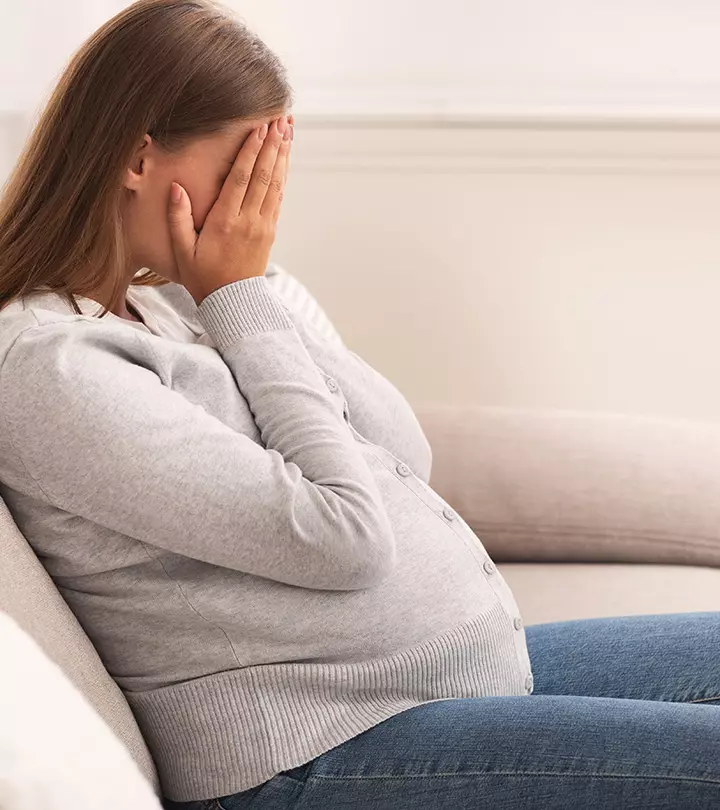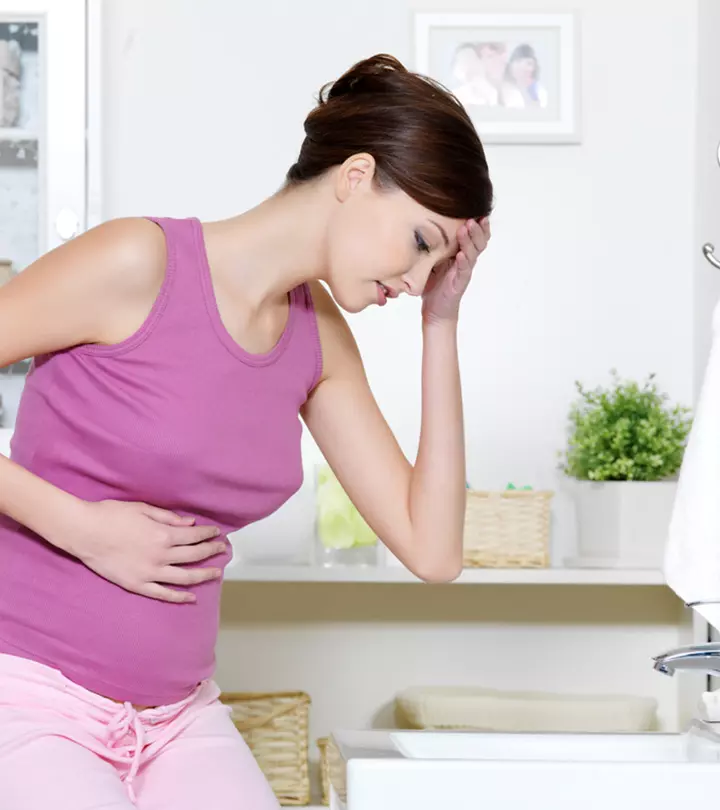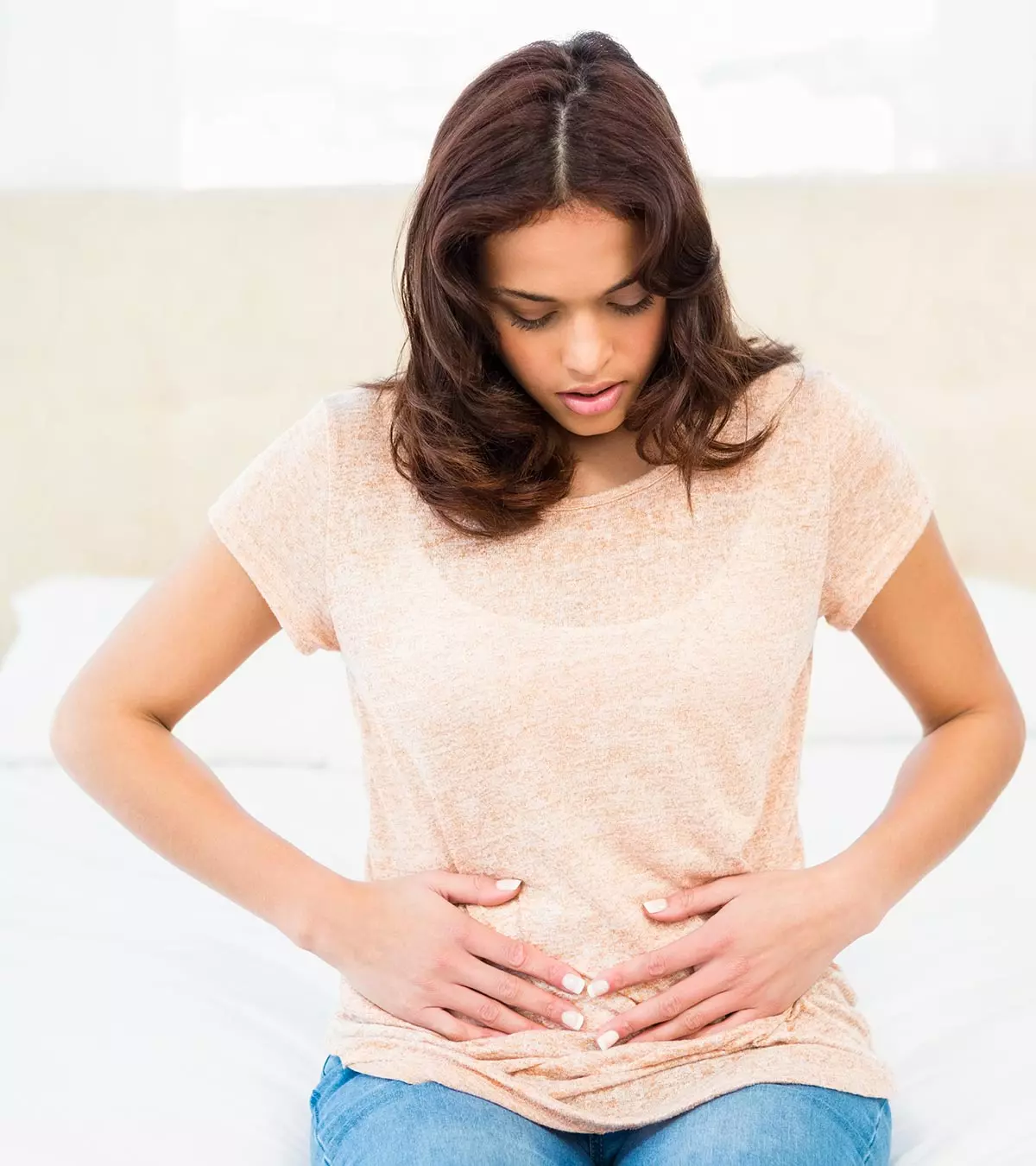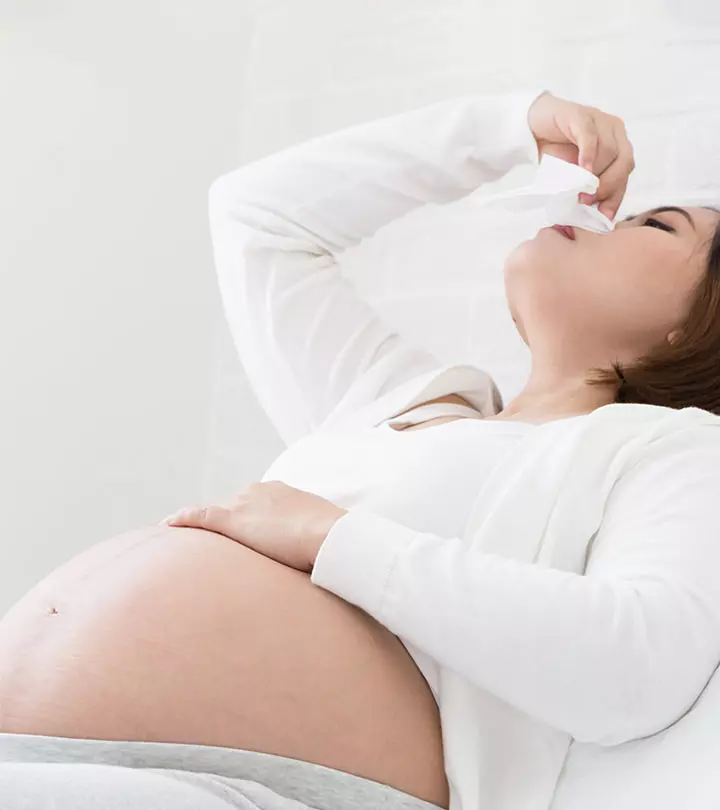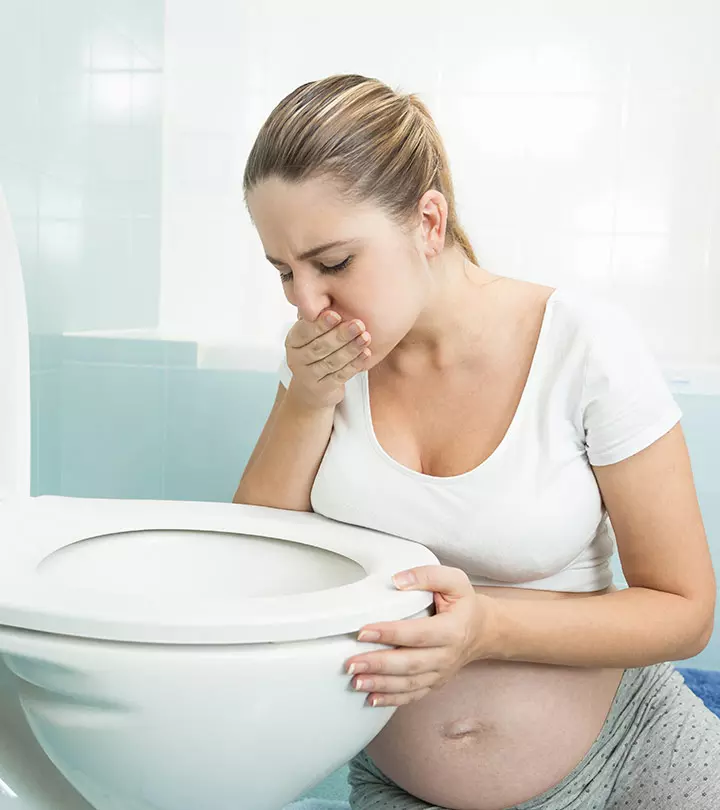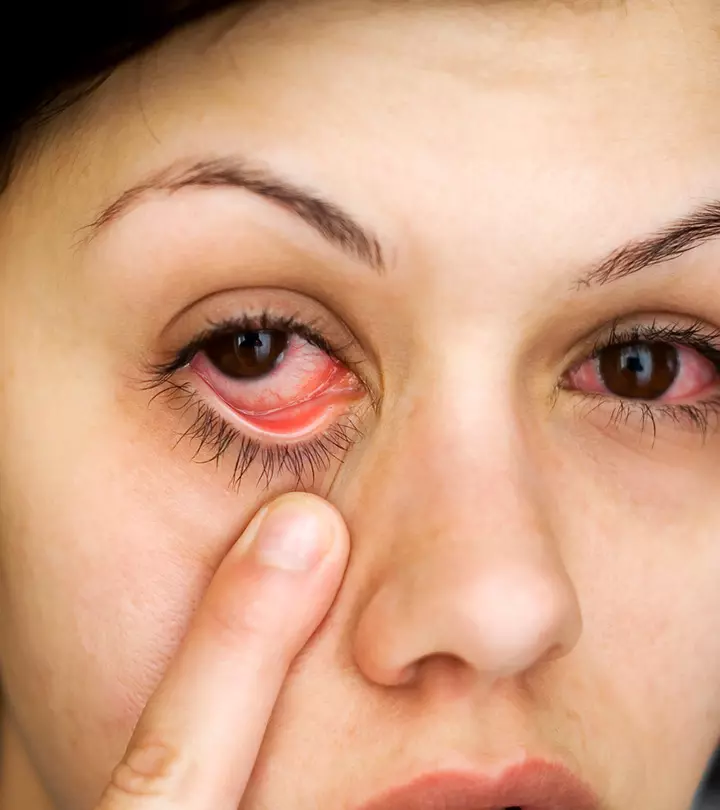
Image: iStock
Rubella or German measles is a highly transmissible viral infection that could affect pregnant women too. Rubella is a teratogenic virus that can cause serious fetal and maternal complications during pregnancy. Rubella begins with flu-like symptoms, such as low fever and sore throat, followed by a rash on the face that later spreads throughout the body (1).

Although routine childhood vaccination against rubella has caused it to become a rare disease in the US, this usually mild infection can cause serious complications in unvaccinated pregnant women (2). According to the World Health Organization (WHO), there is a 90% chance of a pregnant woman with rubella passing the virus on to the fetus. The rate of occurrence of rubella in a pregnant person is similar to that in a non-pregnant individual, with vaccination as the only preventive measure.
In this post, we guide you through the details of rubella in pregnancy, including its causes, symptoms, and treatments.
Key Pointers
- Rubella, also known as German measles, is a viral infection that causes fever, rash, and sore throat.
- The infection spreads through the saliva and mucus of an infected person and typically results in mild illness in pregnant women.
- However, unvaccinated pregnant women may experience adverse effects such as stillbirth, miscarriage, or prematurity.
- Congenital Rubella Syndrome (CRS) refers to the fetal abnormalities caused by the rubella virus during pregnancy.
- Testing and timely vaccination before conception can help prevent the infection during pregnancy.
How Does Rubella Spread?
The rubella virus can be transmitted through the saliva or mucus of an infected person. It is typically an airborne infection and spreads through cough or sneeze droplets. The virus can also spread from an infected person through (3):
- Contaminated objects
- Kissing
- Handshakes
- Shared drinks or foods
Further, a pregnant woman with rubella can transfer the virus to her fetus through the bloodstream.
What Are The Signs And Symptoms Of Rubella?
The manifestation of rubella includes low fever or other flu-like symptoms before the rash appears. The rash starts from the face, spreads to the body within a day, and generally fades away in the same manner after three days. Hence, it is also called the three-day measles. People infected with the rubella virus may also show the following symptoms (2) (4):
- Pink and swollen eyes

- Runny and stuffy nose
- Cough
- Sore throat
- Headache
- Lymphadenopathy or swollen lymph nodes (behind the ears and in the neck)
- Muscle or joint pain (arthritis)
Note: Sometimes, infected people may not show any symptoms but still be carriers of the disease.
What Complications Can Rubella Cause During Pregnancy?
Maternal infection during pregnancy can have serious consequences for the developing fetus. Although rubella is considered a mild disease that resolves with simple treatments, it may cause severe fetal complications in unvaccinated pregnant women. The severity of the disease depends on when it is contracted. Complications are most likely to occur if the infection is contracted during the first trimester (3).
The complications from contracting rubella during pregnancy may include the following (2) (5).
- Congenital rubella syndrome (CRS): CRS occurs when the fetus gets infected with the virus through the mother. It is characterized by low birth weight and severe congenital abnormalities such as:

- Heart defects
- Eye problems such as glaucoma and cataracts
- Deafness
- Delay in growth and learning disabilities
- Diabetes
- Liver and spleen issues
- Microcephaly
- Blindness
- Intellectual disability
- Developmental delay
 Things to know
Things to know- Miscarriage: Miscarriage refers to the baby’s death before 20 weeks of pregnancy.
- Stillbirth: Stillbirth refers to neonatal death after 20 weeks of pregnancy.
- Premature birth: Early delivery before 37 weeks of pregnancy.
An anonymous blogger who is now a grandmother reflects on a poignant event from over 50 years ago when she tragically lost her twins due to rubella during pregnancy. She shares, “I woke up feeling very sick. We were preparing to go to a friend’s wedding. I noticed I had a rash and immediately suspected the worst, that it was rubella … The doctor [also] thought it was rubella and managed to get me an urgent appointment with a specialist, who confirmed the diagnosis.
“At 22 weeks, I bled again, and pains started. Back to hospital. Late in the afternoon, and very suddenly, the waters ruptured, and a tiny baby was born, a boy. In the morning, a nurse came and called me by name and said, ‘Did you know you had another baby?’ It was another boy, much larger than the first tiny babe. And I wept bitterly, for my two dead babies, who had had no chance to live, and who would have faced dreadful damage – sight, hearing, and other effects (i).”
When Can Pregnant Women Take The Rubella Vaccine?
The measles, mumps, and rubella vaccine (MMR) comprising live attenuated rubella virus is an essential part of childhood immunization, and is not recommended during pregnancy.
Instead, it is administered in childhood in two doses. Non-pregnant adults, after consultation with a healthcare provider and an antibody test, can also get vaccinated.
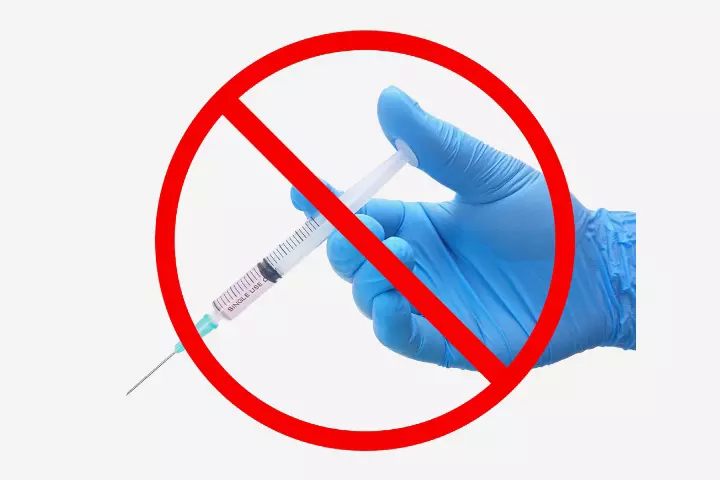
Unvaccinated women who plan on getting pregnant should receive the vaccine at least four weeks before getting pregnant. However, if a pregnant woman contracts the disease, she should wait till after pregnancy to receive the vaccine and discuss the possible treatment options with a healthcare provider (3) (6).
Why Is Screening For The Rubella Virus Needed Before Pregnancy?
Given the pregnancy complications caused by rubella, screening for the virus while planning a pregnancy is important. Screening involves a blood test that checks for IgGantibodies against rubella. A positive blood test confirms the presence of IgGantibodies, while a negative test shows that a vaccine shot needs to be given (7).
What Is The Possibility Of Passing Rubella To Your Baby?
Babies have the highest risk of contracting rubella from their mothers within the first 12 weeks of pregnancy (around 85%). If pregnant women get infected within 13 to 16 weeks, there is a 50% risk of fetal infection, and toward the end of the pregnancy, there is a 25% risk (2).
 Point to consider
Point to considerHow Is Rubella Treated In Pregnancy?

Unfortunately, rubella has no specific treatment. However, your healthcare provider may recommend fever medication and home remedies such as increased water intake, juices, and soup to ease the discomfort. An infected pregnant woman may also be given pregnancy-safe acetaminophen to alleviate the flu symptoms. In case of severe complications, steroids or a blood transfusion may be recommended by the healthcare provider (2) (3).
How To Reduce The Risk Of Rubella In Pregnancy?
The only effective preventive measure for rubella is vaccination. It is important to get the MMR vaccine before pregnancy to avoid prenatal rubella infection and its complications. Since the disease is contagious, avoid any form of contact with infected persons, especially if they have had rashes over their bodies for less than a week (8).
Frequently Asked Questions
1. What does rubella titer in pregnancy mean?
A rubella titer in pregnancy checks for antibodies against rubella through a blood test. The body produces two antibodies against rubella, namely IgG and IgM. The presence of IgM and absence of IgG in the blood indicate recent infection, whereas the presence of IgG and absence of IgM indicate past infection or vaccination. Both the results show immunity to rubella infection (7) (9).
2. Do I need to get a rubella booster before pregnancy?
An MMR booster shot may be given before pregnancy if no antibodies are detected after testing or inadequate doses of MMR vaccine were previously given (10).
3. Can I get a false-positive test for rubella IgM antibodies?
Sometimes, you may get a false-positive rubella antibody test result if you have conditions such as rheumatoid arthritis or mononucleosis. In addition, an incorrect result may also occur in case of a compromised immune system (7).
4. What should pregnant women do if they don’t remember getting the MMR vaccine?
If a pregnant woman does not remember getting the MMR vaccine, she may check with her doctor during her prenatal care visits. Your OB-GYN may conduct a blood test to check for antibodies against rubella (11). If no antibodies are found, treatments may be suggested to manage the symptoms and prevent complications since rubella has no cure.
Infographic: What Are The Symptoms Of Rubella During Pregnancy?
Although rare and usually mild, rubella infection in unvaccinated pregnant women can lead to severe complications, including congenital abnormalities and even a miscarriage or stillbirth. However, knowing the signs of the infection can be helpful for prompt diagnosis and intervention. Check out the infographic below to learn about various symptoms of rubella infection during pregnancy.
Some thing wrong with infographic shortcode. please verify shortcode syntaxRubella, being a contagious infection without a specific cure, should be tested for before pregnancy. While congenital disabilities such as heart problems can be corrected, other congenital problems may be life-long. Hence, it is important to carry out a rubella antibody test before pregnancy and get vaccinated accordingly.
Illustration: Rubella And Pregnancy: Causes Symptoms And Treatment

Image: Stable Diffusion/MomJunction Design Team
Personal Experience: Source
MomJunction articles include first-hand experiences to provide you with better insights through real-life narratives. Here are the sources of personal accounts referenced in this article.
i. Vaccinations: a personal case for them.https://idlepersiflage.blogspot.com/2015/04/
References
- Rubella (German Measles Three-Day Measles).
https://www.cdc.gov/rubella/ - Rubella And Pregnancy.
https://www.marchofdimes.org/find-support/topics/pregnancy/rubella-and-pregnancy - Rubella.
https://www.healthlinkbc.ca/healthlinkbc-files/rubella - Rubella Symptoms and Complications.
https://www.cdc.gov/rubella/signs-symptoms/?CDC_AAref_Val=https://www.cdc.gov/rubella/about/symptoms.html - Congenital Rubella Symptoms And Causes.
https://www.childrenshospital.org/conditions-and-treatments/conditions/c/congenital-rubella/symptoms-and-causes - Rubella vaccine (MMR) before pregnancy.
https://www.tommys.org/pregnancy-information/planning-a-pregnancy/are-you-ready-to-conceive/rubella-vaccine-mmr-pregnancy - Rubella.
https://www.urmc.rochester.edu/encyclopedia/content?contenttypeid=167&contentid=rubella - Paediatr Child Health (2007). Rubella (German measles) in pregnancy.
https://www.ncbi.nlm.nih.gov/pmc/articles/PMC2532864/ - Measles Mumps Rubella Antibody.
https://www.urmc.rochester.edu/encyclopedia/content?contenttypeid=167&contentid=mmr_antibody - Vaccines for women: Before conception during pregnancy and after a birth.
https://www.health.harvard.edu/blog/vaccines-for-women-before-conception-during-pregnancy-and-after-a-birth-2020011018649 - Thinking of getting pregnant? Make sure you are protected against German measles.
https://www.nhs.uk/livewell/contraception/documents/rubella-pregnancy.pdf - Pregnancy and Rubella.
https://www.cdc.gov/rubella/pregnancy/?CDC_AAref_Val=https://www.cdc.gov/rubella/pregnancy.html - Rubella.
https://my.clevelandclinic.org/health/diseases/17798-rubella#symptoms-and-causes
Community Experiences
Join the conversation and become a part of our nurturing community! Share your stories, experiences, and insights to connect with fellow parents.
Read full bio of Dr. Kritika Shashank Verma
Read full bio of Aneesha Amonz
Read full bio of Rebecca Malachi
Read full bio of Dr. Joyani Das






